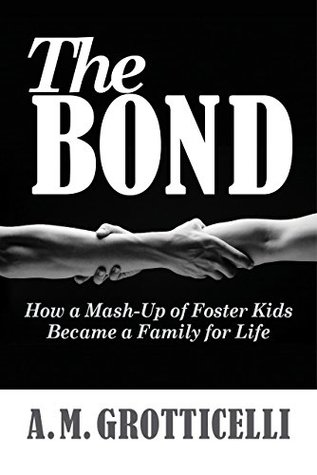The Bond traces the journey of an unusual family made up of three unrelated sets of children from different backgrounds all raised in the same foster-care house. We were a collection of eight kids, all from broken homes, who were searching for the stability of an intact family. Unfortunately, that foster family imploded as well, but through sheer will and desperation we
Read The Bond: How A Mash-Up Of Foster Kids Became A Family For Life - A.M. Grotticelli | ePub
Related searches:
Some foster parents get into foster parenting believing that it takes only love to change a child. That may work with your average kid, but children that are in foster care are far from average. They require a lot of special care and that is why a lot of the ideas that therapists present to you may sound bizarre.
Children need to connect in a compelling and significant way with those who care for them. The disruption of a bonded relationship does considerable damage. The presentation and proof of bonding between the child and the foster/adopt parents may be the strongest argument for keeping them together, especially in a contested adoption.
Nov 15, 2019 lizzy struggles the most with readjusting into their home.
May 19, 2020 interview with siriusxm's the morning mash up on tuesday, sharing that she adopted the teenage boys when they were leaving foster care.
The importance of attachment in the lives of foster children: key messages from research the british psychiatrist john bowlby pioneered the concept of attachment in the 1940s, and used t term ‘attachment bond’ to describe a warm, intimate and continuous relationship with a mother.
Published in the december 2015 issue of policy and practice the term “bonding” is frequently used but rarely defined. (1) when a court decides where to place a child whose primary residence has been shattered, certain guidelines must be followed.
About one in four children and youth in foster care will experience a specific set of symptoms known as posttraumatic stress disorder (ptsd).
Jan 18, 2018 how we reached this point is a mash-up of the accidental and the way, we turned first to science and then to foster care adoption.
Forming a bond between you and your adopted child will take time. Don’t expect you and your child to be instantly bonded the second they walk through your door. It’s also important to not set a goal for when you want this bond to form; let it happen naturally.
10 ways to bond with your child as a foster or adoptive dad happy father’s day to all you great dad’s out there! this year we’re dedicating our dad-day blog to foster and adoptive dads! check out our top 10 tips for foster and adoptive dads to strengthen the bond with their children.
Social workers didn't even try to keep my children together when they were placed for adoption.
Most foster children will need to attend weekly therapy sessions with a therapist as part of their foster care. You may have the option of having school based therapy for the child or home based therapy.
The primary focus was why foster parents are unable to form a bond with the children placed in their home and the effects of not forming any attachment to the children. The results can be extremely negative for the children for many reasons including the foster parents not being invested in the child and providing only minimal standards of care.
Inviting a foster child into your home means adding a new person to your family. Even if temporary, they are now a member of your household, and the attitude you bring to the table while foster parenting is key to forming a bond.
When a parent and child have a healthy and strong bond, it is likely that the child will be more inclined to share both positive and difficult news with their parent(s). Child-father bonding bonding with one’s child is not strictly maternal– dads are encouraged to bond with their children at birth and at all stages in their life.
With a foster child, you don’t have the luxury of bonding as parent and child from birth and onward. In fact, your foster child may well spurn your attempts at expressing your love.
This qualitative research describes how 27 foster children, aged 12–18 years placed in long-term family foster care, experience the concept ‘family’. Foster children had a pragmatic and open-minded view of the concept ‘family’, transcending the conventional definition of kinship.
The bond: how a mash-up of foster kids became a family for life [grotticelli, a m] on amazon. The bond: how a mash-up of foster kids became a family for life.

Post Your Comments: